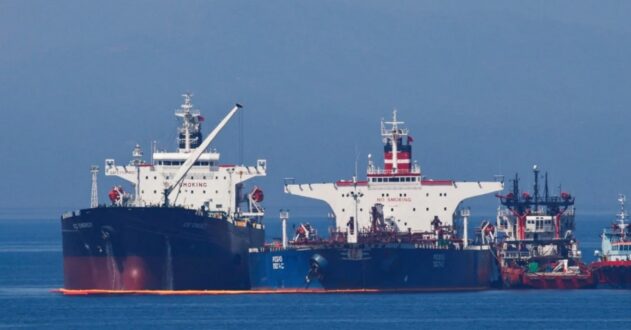Al-Monitor – The day after Hamas launched its surprise attack against Israel on Oct. 7, where scores of Israelis were killed and abducted by the Islamic militants in the south of the country, the Israeli government ordered the Tamar gas field shut down.
The field is Israel’s second largest, holding some 10 trillion cubic feet of natural gas, and is owned by Chevron, Dor Gas Exploration Limited Partnership, Everest Infrastructures, Isramco Negev 2, UAE-based Mubadala Investment and the Israeli company Tamar Petroleum. Before the shutdown, the field typically met around 70% of Israel’s power generation needs.
Israel has so far managed to backfill gas supplies from its other fields to meet domestic demand and supply international customers, but the escalated conflict and the closure of Tamar have caused jitters in the energy market, with heightened fears of a wider war involving other Middle Eastern states.
Liquified natural gas (LNG) spot prices rallied by more than 40% on Wednesday, to $18.345 per one million British thermal units (MMBtu), an eight-month high. Multiple reports suggest that some LNG buyers in North Asia have paused plans to acquire additional winter fuel as a result of Hamas’ attack and Israel’s retaliatory bombardment of Gaza.
Prices ballooned last winter amid soaring inflation and Western sanctions on Russia — formerly Europe’s largest supplier of oil and gas — due to its invasion of Ukraine in early 2022. Fortunately for many on the continent, the winter was relatively warm.
Callum Macpherson, head of commodities at Investec, explained that the structural shortage of gas for Europe due to the sanctions on Russian energy exports was much more pronounced than it was for oil, making gas prices and hence electricity prices more sensitive than oil ones. Oil flows are also much easier to redirect than gas flows.
“European gas storage is almost full, but we have a long winter ahead of us yet, and so if any supply risk emerges, we have to think what will happen if that materializes,” he told Al-Monitor. “You then also have to factor in the risk that winter turns out to be unusually cold — adding to supply pressure. In that scenario, we might see a return to the kind of price behavior that became common in 2022. If the winter is relatively mild, the high inventories mean we could see gas prices easing.”
Robin Mills, chief executive of Qamar Energy, believes the worst-case scenario could be “very bad” for Europe, but so far remains unlikely, as prices have already withstood two major wars, attacks on energy infrastructure and disruption of gas and oil supplies.
“More likely [are] some isolated attacks on tankers etc., tightened enforcement of sanctions on Iran taking a few hundred thousand barrels per day of oil off the market again, and a longer shutdown of Israeli gas supplies to Egypt, stopping its restart of LNG exports,” Mills told Al-Monitor.
Damage control and high EU inventories
European leaders are scrambling to implement damage control to prevent the conflict from escalating. British Prime Minister Rishi Sunak arrived in Israel on Thursday to meet with Prime Minister Benjamin Netanyahu, while German Chancellor Olaf Scholz paid a visit on Tuesday before heading for talks in Egypt. European Commission President Ursula von der Leyen had traveled to Israel last week.
To allay further political risk and disruption to energy markets, European officials are working to avoid or limit conflict with Iran — Israel’s archnemesis and backer of Hamas, Islamic Jihad and Lebanon-based Hezbollah — and will be prepared to use spare oil production capacity if Iranian exports are disrupted by further sanctions. Mills said a restart of the Tamar facility will take place as soon as it is deemed safe.
Paul Horsnell, global head of commodities research for Standard Chartered Bank, said that the fundamentals indicate that Europe remains very well supplied with gas, despite the recent turmoil.
The EU’s LNG inventories are at an all-time high, around 113.4 billion cubic meters (bcm), which is more than 97% of storage capacity, according to Gas Infrastructure Europe.
“Even in an unusually harsh winter, that will be more than enough to keep Europe well supplied, helped by demand still being very depressed,” Horsnell told Al-Monitor. “The market is currently high (front-month TTF above EUR 50/MWh) mainly due to supply fears.”
In addition to the Tamar closure causing concerns that Egypt’s LNG exports might be reduced to Europe, there are also fears that potential labor strikes at LNG facilities in Australia — one of the world’s top LNG producers — might further tighten the market and reduce flows to Europe, the analyst said. Last week, new worries emerged that the damage to the Balticconnector pipeline — which supplies gas and data between NATO member states Estonia and Finland — could signal a heightened sabotage risk to Europe’s energy network.
“The actual effect of all of those three isn’t really likely to be very much in terms of scale, and all very easily covered without making much of a dent in 113+ bcm of inventory,” Horsenell said. “But despite all those overdone supply fears, prices are still lower by two-thirds year-on-year, and it is hard to see how prices could move higher over the winter compared to the previous one. In fact, there’s so much gas I’m not sure how a price collapse can be avoided in the spring when inventories finish their seasonal draw if not before.”
Chris Louney, lead analyst on global commodity strategy and the MENA research team at RBC Capital Markets, said higher European natural gas prices as a result of the Israel-Hamas conflict serves as a reminder that despite high storage inventories, work to secure additional supply, and both voluntary and involuntary demand-side adjustments, winter energy prices could still prove a pain point.
He told Al-Monitor: “While US gas markets remain more insulated, international headlines in global gas markets are pricing in fear premiums due to suspected sabotage on a Baltic Sea pipeline and the risks stemming from the Israel-Hamas war, all this underscoring the fact that geopolitical premiums are not in the rearview mirror. While European gas markets may not necessarily experience the worst of winter pricing seen in recent years, risks are quite clearly skewed to the upside.”
 Shabtabnews In this dark night, I have lost my way – Arise from a corner, oh you the star of guidance.
Shabtabnews In this dark night, I have lost my way – Arise from a corner, oh you the star of guidance.



